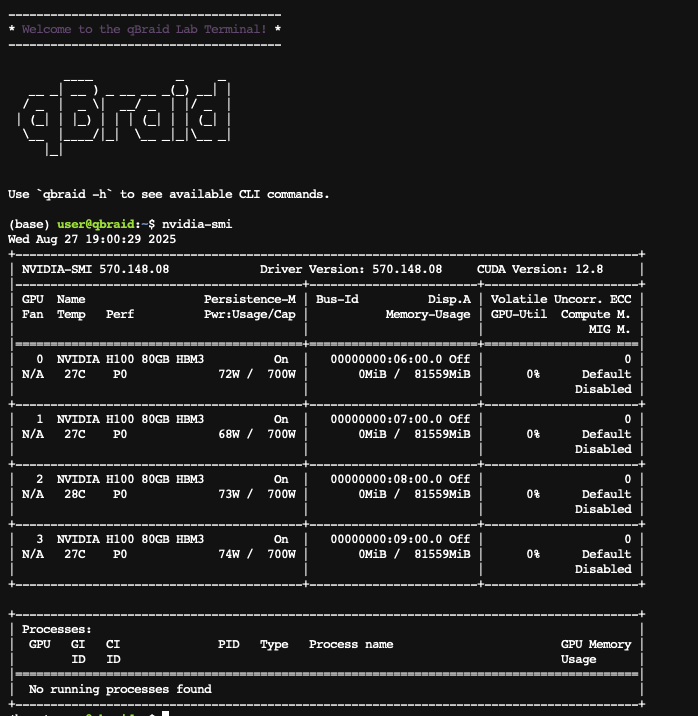Collaborations
2
Min read
Access AQT’s IBEX Q1 on qBraid Lab, enabling researchers and developers to run experiments on fully connected trapped ion quantum hardware

Contents:
qBraid will lead a team of researchers from MIT, UChicago, Argonne National Laboratory, and QuEra to develop quantum computing solutions for studying the interaction of metals and intrinsically disordered proteins
Chicago, IL – [Channel] – October 4th, 2023 – Wellcome Leap’s Quantum for Bio (Q4Bio) supported challenge program has awarded qBraid, a rapidly growing quantum computing software company, and its collaborators a contract to develop a quantum algorithm pipeline to better understand the underlying impacts of the proteins amyloid-β and α-synuclein on neurodegenerative diseases such as Alzheimer’s Disease and Parkinson’s Disease.
Under the project, qBraid will develop a quantum software pipeline alongside collaborators from MIT, the University of Chicago, the U.S. Department of Energy’s Argonne National Laboratory, and QuEra. The aim of Wellcome Leap’s funding is to accelerate progress toward developing quantum algorithms which, in the next 3-5 years, will enable biology and healthcare applications. In line with this goal, the qBraid team will work over the course of phase 1 (1 year) to research and develop quantum algorithms that can aid in understanding the interactions between intrinsically disordered proteins (IDPs), relevant to neurodegenerative diseases, and transition metals, a field that is under intensive research. Specifically, the team will target metal-protein interactions involving amyloid-β (aβ) and α-synuclein (αs) which are implicated in Alzheimer’s disease (AD) and Parkinson’s disease (PD), respectively. The interactions between transition metals (copper, iron, etc.) and these IDPs are thought to play essential roles in the pathogenesis of neurodegenerative diseases. Much progress has been made in longitudinal studies as well as classical approaches, but current research involving certain metal-protein interactions is met with classical computational limitations, where the presence of multireference electron wave functions and high-correlations causes needed resources to scale exponentially. The qBraid collaboration’s approach seeks to sidestep these issues by using and developing certain quantum algorithms that have shown promise in areas where classical computation is limited. MIT’s Haslam and Dewey Professor of Chemistry Troy Van Voorhis recognizes that the collaboration with qBraid “holds significant potential to bridge quantum industry and academia at the biology-chemistry interface, and what the team will set out to do has never been accomplished before.”
qBraid’s proposed quantum algorithmic pipeline will leverage the resources of near-term quantum hardware to better understand certain IDPs and their interaction with transition metal ions, with the hope that this will lead to accelerated research in the development of effective therapies for Alzheimer’s and Parkinson’s Disease. As UChicago collaborator Richard and Kathy Leventhal Professor in the Department of Chemistry, the Pritzker School of Molecular Engineering, and the James Franck Institute, Director of the Chicago Center for Theoretical Chemistry Laura Gagliardi mentions, "We are thrilled to be involved in a groundbreaking project aimed at tackling major medical challenges, such as Alzheimer's and Parkinson's diseases. Our focus will be on the development of cutting-edge quantum chemistry computational methods, harnessing the immense potential of quantum technologies. This is a unique opportunity, which finds its perfect home in the vibrant quantum landscape of the Chicago area.” Including Chicago, the project will invigorate quantum involvement in North Carolina as collaborating Professor Raymond Samuel of NCA&T states, “We are looking forward to working with our colleagues to bring quantum computing into an area of biochemistry.”
Another key collaborator, Dr. Yuri Alexeev, a computational scientist at Argonne National Laboratory, is ecstatic to explore how “variational quantum algorithms will be integrated with fragment molecular orbital (FMO) and other classical quantum chemistry methods. This is an important development allowing us to significantly scale up variational quantum algorithms and their applicability for solving grand-challenge problems in the biomedical field of science.”
Notably, the Wellcome Leap funded project aims to target deployment of the developed quantum algorithms on quantum computers ordering on the range of 100 to 300 physical qubits with the ability to implement circuit depths of roughly 105 to 107. Given the nascency of quantum computing and quantum hardware, the Q4Bio project is well aimed in bringing commercialization to the forefront of QISE initiatives and the qBraid team is poised to take advantage of Q4Bio’s funding with their expertise. As QuEra’s CTO Nate Gemelke states, “the use of QuEra’s hardware will be an exciting demonstration of the robust capabilities of our neutral atom hardware as well as a leading indicator of directions to further quantum variational algorithms for healthcare applications.” The qBraid team are also excited to work with QuEra’s neutral atom hardware to push toward successful execution on real hardware by 2025. As qBraid’s quantum research scientist Kenny Heitritter mentions, “the QuEra neutral atom quantum computer has already demonstrated significant capabilities in scalability and high-fidelity control, making it an excellent choice for near term quantum computing applications.”
In addition to the algorithmic development and testing, the program allows the commercialization of its products. In this regard, qBraid expects to turn the developed quantum algorithms and associated technology into a fully fledged product offered via their cloud platform. qBraid’s CEO and co-founder, Kanav Setia notes that the “Use of quantum computers for understanding binding sites on protein molecules is one of the most challenging tasks with profound implications for mankind. We are grateful to the Wellcome Leap organization for providing our team an opportunity to push the envelope. When successful, we plan to commercialize our technology rapidly and deliver benefits to society.” qBraid’s vision is to be the one-stop platform for developing and deploying quantum applications. The team believes this project brings qBraid one step closer to the realization of their vision of being the one-stop platform for developing and deploying quantum applications.
About qBraid
qBraid is a premiere cloud platform for quantum software development. With proven usage in academia, industry, and the world’s top hackathons at QuantX, MIT, Stanford x Yale, and NYUAD, qBraid’s users can easily get started on 10+ quantum computers and dive deep into complex algorithms related to financial optimization, quantum machine learning and more with 25+ quantum software environments - all in one platform. qBraid is on YouTube, LinkedIn, and Twitter.
For more information on qBraid visit: https://www.qbraid.com/
Media Contact
Email: contact@qbraid.com
Phone: 2487959039

Collaborations
2
Min read
Access AQT’s IBEX Q1 on qBraid Lab, enabling researchers and developers to run experiments on fully connected trapped ion quantum hardware

Press Releases
2
Min read
qBraid wins NSF POSE grant to build open source ecosystem

Product
3 minutes
Min read
Supercharge your quantum workflows with GPUs on qBraid

Collaborations
2
Min read
Access AQT’s IBEX Q1 on qBraid Lab, enabling researchers and developers to run experiments on fully connected trapped ion quantum hardware

Collaborations
3 minutes
Min read
qBraid has been selected by IBM to host their annual Qiskit Global Summer School for the second year in a row.

Collaborations
5
Min read
As an early adopter of the NVIDIA GH200 Grace Hopper Superchip systems, qBraid provides unparalleled access to today’s most advanced computing technologies.

Collaborations
1
Min read
Explore the advantages of cloud-based quantum computing and how it is revolutionizing research and development across various industries

Collaborations
1
Min read
Discover how quantum computing is revolutionizing enterprises, from enhancing cybersecurity with quantum encryption to optimizing complex logistics and supply chain operations.

Collaborations
5
Min read
qBraid’s quantum computing platform adds access to 256 qubit neutral atom quantum computer, Aquila by QuEra.

Collaborations
5
Min read
qBraid and Quantum Algorithms Institute partner to accelerate the pace of quantum computing in British Columbia and beyond.

Collaborations
4
Min read
The qBraid platform will allow users to play with Pulser in a matter of a few minutes.

Hackathons
5
Min read
As part of QHack, qBraid is providing the best quantum developer notebook environment experience for challengers.

Hackathons
10
Min read
From October 21st to November 5th of 2022, qBraid hosted HAQS, one of the most popular quantum computing events of the year, where participants from around the world worked on solving a total of five quantum computing challenges during the two weeks of the event.

Hackathons
5
Min read
At this year's QCHack, participants attended a week filled with amazing talks, 1:1 sessions with academic and industry mentors, and a 24 hour hackathon hosted by Stanford, Yale and Berkeley.
-min.jpeg)
Hackathons
4
Min read
The potential of the field of quantum computing is so huge that everyone in the field cannot wait for all the promises that the field holds to become a reality.

Research
5
Min read
IEEE has awarded qBraid and its collaborators 1st place for the Best Paper Award in the Quantum Algorithm Track.

Research
1
Min read
qBraid's team used hybrid classical-quantum algorithms to determine the best flight path

Research
1
Min read
Learn how classical sampling methods, such as Markov Chain Monte Carlo, can estimate truncation errors in simulating bosons on quantum computers, aiding resource assessment and result validation for quantum simulations, including applications in two-dimensional lattice scalar field theory.

Press Releases
2
Min read
qBraid wins NSF POSE grant to build open source ecosystem

Press Releases
10
Min read
qBraid and NVIDIA CUDA-Q are removing the two biggest blockers to AI4Quantum research

Press Releases
8
Min read
Our first cohort of the qBraid Alliance, a partnership with student organizations at leading universities around the country.

Press Releases
5
Min read
Coming from IBM Quantum Lab? Learn how to start using qBraid Lab

Press Releases
10
Min read
The Bloch develops quantum technology solutions for society’s most pressing problems by accelerating industry adoption to drive research commercialization, catapulting US leadership in quantum information science and technology.

Press Releases
5
Min read
Our newest podcast series

Press Releases
5
Min read
qBraid will lead a team of researchers from MIT, UChicago, Argonne National Laboratory, and QuEra to develop quantum computing solutions for studying the interaction of metals and intrinsically disordered proteins.

Press Releases
Min read
OSU uses qBraid for accessing Intel Quantum SDK

Press Releases
5
Min read
qBraid provides agnostic connections to quantum computers and simulators thanks to Amazon Braket

Press Releases
10
Min read
Duality Quantum Accelerator Accepts Six Startups into Inaugural Cohort

Press Releases
1
Min read
Take the QuBes (Quantum Beginners) course to learn quantum computing.

Press Releases
5
Min read
qBraid aims to increase accessibility to, and interoperability amongst, quantum computing resources.

Product
3 minutes
Min read
Supercharge your quantum workflows with GPUs on qBraid
.png)
Product
5
Min read
We are pleased to have presented qBraid’s Platform-Agnostic Open-Source Tools at the Quantum Computing Devroom in FOSDEM 2025.

Product
5
Min read
Accelerating hybrid workflows using Pennylane's embedded simulators with NVIDIA GPUs on qBraid Lab.

Product
5
Min read
Here are 3 ways to install python packages on qBraid

Product
2
Min read
How to install Cirq v1.2.0 environment on qBraid Lab

Product
1
Min read
Let qBraid help you take your first step into the quantum world!

Product
1
Min read
Intel® Quantum SDK is generally available on qBraid Lab for Free with no installation necessary

Product
1
Min read
Dive into the intricate interplay of the Bernoulli line and the Bloch sphere, revealing profound geometric insights into quantum state dynamics.